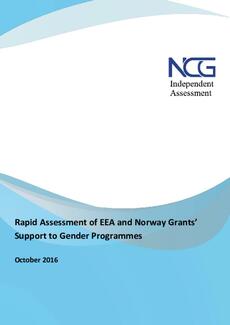2.26 MB

Rapid assessment of the gender programmes under the 2009-2014 funding period. The assessment was conducted by NCG Norway and was published in November 2016.
Main findings:
- The Grants’ contribution to the overall funding for gender equality in some countries is low; however the Grants played a role in filling funding gaps. For example, the Grants enabled the expansion of work into certain geographical areas or support for specific target groups that had been underfunded or overlooked (such as ethnic minorities or rural areas).
- Broadly speaking, the programmes have responded to beneficiary needs, such as the need for physical protection, legal/administrative recourse, or labour market participation.
- Levels of effectiveness are often determined by how project interventions are combined. For example, (in difficult contexts) building the capacity of the police/judiciary leads to increased reporting of domestic violence/gender-based violence ONLY when coupled with research AND campaigns for the general public.